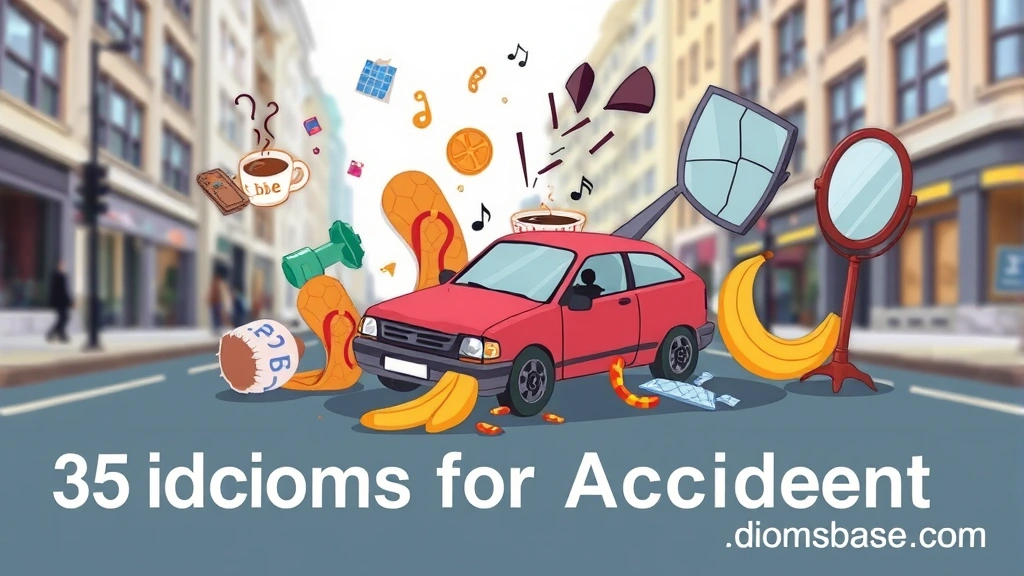Have you ever had one of those days where everything just goes wrong? You know, the kind of day where you trip over your own feet, spill coffee down your shirt, and then accidentally send a text to the wrong person? We've all been there! Life is full of unexpected twists and turns, and sometimes, well, accidents just happen.
But did you know there's a whole world of colorful expressions to describe these mishaps? English is incredibly rich when it comes to idioms, and there are many fantastic phrases to talk about things going wrong, either by chance or by mistake. Learning these idioms isn't just fun; it also helps you understand native English speakers better and makes your own conversations much more vibrant.
Ready to dive into a treasure trove of expressions? Let's explore 35 brilliant idioms that perfectly capture those "oops!" moments and accidental happenings!
35 Idioms for Accidents
Get ready to add some flair to your vocabulary! Here are 35 fantastic idioms related to accidents, mistakes, and things going awry.
-
Accident waiting to happen: This describes a situation or person that is highly likely to cause an accident or problem in the future.
- Example: "That old, wobbly ladder is an accident waiting to happen."
-
To bite the dust: To fail, be defeated, or suffer a significant setback. Often used for machines breaking down.
- Example: "My old laptop finally bit the dust after ten years."
-
To break a leg: Ironically, this means "good luck!" It's often said to performers before a show.
- Example: "You've got your audition today? Break a leg!"
-
To break new ground: To do something innovative or significantly different. Not directly an accident, but often involves risks.
- Example: "Her research is breaking new ground in renewable energy."
-
To cut corners: To do something in the easiest, quickest, or cheapest way, often by sacrificing quality or safety. This can lead to accidents!
- Example: "They cut corners on the construction, and now the roof leaks."
-
To drop the ball: To make a mistake, especially by failing to do something you were responsible for.
- Example: "I really dropped the ball on that project deadline."
-
To fall flat: To fail completely to produce an intended effect or impression.
- Example: "His joke fell flat, and no one laughed."
-
To get off on the wrong foot: To start a relationship or activity badly.
- Example: "We really got off on the wrong foot during our first meeting."
-
To go down in flames: To fail spectacularly or disastrously.
- Example: "Their new business venture went down in flames within a year."

-
To go belly up: To fail completely, often used for businesses.
- Example: "The restaurant went belly up after only six months."
-
To hit a snag: To encounter an unexpected problem or obstacle.
- Example: "We hit a snag in the plans when the supplier ran out of materials."
-
To hit rock bottom: To reach the lowest possible point in one's life or a situation.
- Example: "After losing his job and his home, he felt he had hit rock bottom."
-
To kick the bucket: An informal, somewhat humorous way to say "to die."
- Example: "My old car is about to kick the bucket."
-
To make a blunder: To make a stupid or careless mistake.
- Example: "The politician made a huge blunder during the live interview."
-
To make a mess of something: To do something very badly or spoil it.
- Example: "I really made a mess of that cake recipe."
-
To make a mountain out of a molehill: To exaggerate the importance or difficulty of a small problem.
- Example: "Don't make a mountain out of a molehill; it's just a small scratch."
-
To mess up: To make a mistake or spoil something.
- Example: "I messed up my order at the coffee shop."
-
To go pear-shaped: To go wrong, to fail, or to turn out badly.
- Example: "The whole plan went pear-shaped when the power went out."
-
To pull a stunt: To do something daring, dangerous, or attention-seeking, often with a risk of an accident.
- Example: "He pulled a risky stunt on his skateboard and nearly broke his arm."

-
To run into trouble: To encounter difficulties or problems.
- Example: "They ran into trouble trying to cross the border without proper documents."
-
To shoot oneself in the foot: To accidentally harm one's own cause or interests.
- Example: "He shot himself in the foot by criticizing his boss during the meeting."
-
To slip up: To make a small mistake.
- Example: "I slipped up and told her about the surprise party."
-
To stumble upon: To find something by chance or unexpectedly. Not always negative, but implies an accidental discovery.
- Example: "I stumbled upon this amazing little cafe while walking around."
-
To throw a wrench in the works: To introduce a problem or difficulty that prevents something from happening as planned.
- Example: "The sudden budget cuts threw a wrench in the works for our expansion plans."
-
To come to grief: To suffer misfortune or failure.
- Example: "Their ambitious business venture eventually came to grief."
-
To have an off day: To perform poorly or feel unwell, not up to one's usual standard.
- Example: "Sorry, I'm just having an off day today."
-
To be a train wreck: To be a complete and utter disaster, often used to describe a situation or a person's life.
- Example: "The entire presentation was a train wreck."
-
To hit a brick wall: To encounter an insurmountable obstacle or a point beyond which no progress can be made.
- Example: "We hit a brick wall with our research when we couldn't find any more data."
-
To go awry: To go wrong or astray from the expected course.
- Example: "The carefully planned experiment went awry."

-
To have a close shave: To narrowly escape a dangerous situation or accident.
- Example: "He had a close shave when the car nearly hit him."
-
To be out of control: To be beyond management or restraint, often leading to accidents.
- Example: "The fire quickly got out of control."
-
To hit bottom: Similar to "hit rock bottom," to reach the absolute lowest point.
- Example: "The company's sales hit bottom last quarter."
-
To take a spill: To fall, often accidentally.
- Example: "The child took a spill off his bike."
-
To go haywire: To malfunction or go crazy, often referring to machinery or systems.
- Example: "The computer system went haywire after the power surge."
- To be in a pickle: To be in a difficult or awkward situation. While not directly an accident, it often results from one.
- Example: "I'm in a real pickle because I promised to be in two places at once."
Frequently Asked Questions
Q1: Why are idioms important to learn?
Learning idioms is super important because they make up a huge part of everyday conversation for native English speakers. They add color and nuance to language. If you don't understand idioms, you might miss the true meaning of what someone is saying, even if you know all the individual words. Plus, using them correctly makes you sound more natural and fluent!
Q2: How can I remember so many idioms?
Great question! It can seem overwhelming at first, but here are some tips:
- Context is Key: Try to learn idioms in sentences, not just as isolated phrases.
- Visualize: Many idioms create a strong image in your mind (like "go belly up"). Use that to your advantage!
- Practice: Use them in your own conversations, writing, or even just by talking to yourself. The more you use them, the more they'll stick.
- Group Them: Learn idioms related to a specific topic, like "accidents" as we did here, or "money" or "emotions."
- Flashcards or Apps: Use tools to help you review regularly.
Q3: Are these idioms formal or informal?
Most of the idioms on this list are considered informal or semi-formal. You'd hear them often in casual conversations, TV shows, and even some business settings, depending on the company culture. Some, like "kick the bucket," are quite informal and might be considered slang. It's always good to be aware of the context when you use them!
Q4: Can I use these idioms in writing?
Absolutely! Using idioms in your writing can make it more engaging and expressive, especially in creative writing, personal essays, or informal communication like emails to friends. For very formal academic or professional writing, you might want to use them sparingly or avoid them altogether, as clarity and precision often take precedence over colorful language in those contexts.
Q5: What's the difference between an idiom and a proverb?
That's a common point of confusion!
- An idiom is a phrase where the meaning isn't obvious from the individual words. For example, "to bite the dust" doesn't literally mean biting dirt.
- A proverb is a short, well-known saying that expresses a general truth or piece of advice. For example, "Actions speak louder than words" is a proverb.
So, while both are fixed expressions, idioms are about non-literal meaning, and proverbs are about wisdom or advice.
Key Takeaways
Wow, we've covered a lot of ground today, haven't we? Let's recap the most important points:
- Idioms Enrich Language: They add depth, color, and naturalness to your English, helping you sound more like a native speaker.
- Context is Crucial: Always pay attention to how idioms are used in sentences to grasp their full meaning.
- Practice Makes Perfect: The more you use these idioms, the more comfortable and confident you'll become with them.
- Variety is the Spice of Life: English has an incredible range of idioms, and these 35 related to accidents are just a tiny glimpse into that fascinating world.
- Accidents Happen, and We Have Words for Them! From "dropping the ball" to things "going pear-shaped," there's an idiom for almost every mishap.
So, next time something doesn't go quite as planned, or you hear someone describe a tricky situation, you'll be well-equipped to understand and even use these fantastic expressions. Keep practicing, keep exploring, and keep making your English shine!






